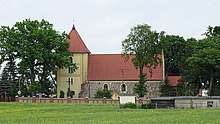Rogóźno, Kuyavian-Pomeranian Voivodeship
Rogóźno [rɔˈɡuʑnɔ] (German: Roggenhausen) is a village in Grudziądz County, Kuyavian-Pomeranian Voivodeship, in north-central Poland.[1] It is the seat of the gmina (administrative district) called Gmina Rogóźno.
Rogóźno | |
|---|---|
Village | |
 Rogóźno | |
| Coordinates: 53°32′8″N 18°55′41″E | |
| Country | |
| Voivodeship | Kuyavian-Pomeranian |
| County | Grudziądz County |
| Gmina | Rogóźno |
| Population | 960 |
The settlement lies in the historic Chełmno Land, approximately 12 kilometres (7 mi) north-east of Grudziądz and 60 km (37 mi) north of Toruń. In 2011 the village had a population of 946.

In 1226 Duke Konrad I of Masovia had called for the Teutonic Order to fight against the pagan Old Prussian tribes, and Emperor Frederick II ceded the lands east of the Vistula river to the Knights according to his Golden Bull of Rimini. The Order had a castle (Ordensburg) built at Groß-Rogis —present-day Rogóźno-Zamek— about 1275. Soon after, a parish church was erected near the fortress and a settlement arose. After the Thirteen Years' War 1454–66, the Chełmno region seceded from the State of the Teutonic Order and was incorporated into Chełmno Voivodeship of Royal Prussia, a fief of the Polish Crown.
Devastated by Swedish troops in the 17th century, the parish church had to rebuilt twice, using stones from the decayed Order's castle. Rogóźno was annexed by the Kingdom of Prussia during the First Partition of Poland in 1772. Part of the West Prussia province, the settlement prospered and by the 19th century was one of the largest villages in the Marienwerder region. Upon the 1919 Treaty of Versailles, the area was ceded to the Second Polish Republic.
Notable residents
- Johannes von Kries (1853–1928), psychologist
- Werner Dobberstein (1911–1993), Kriegsmarine officer
